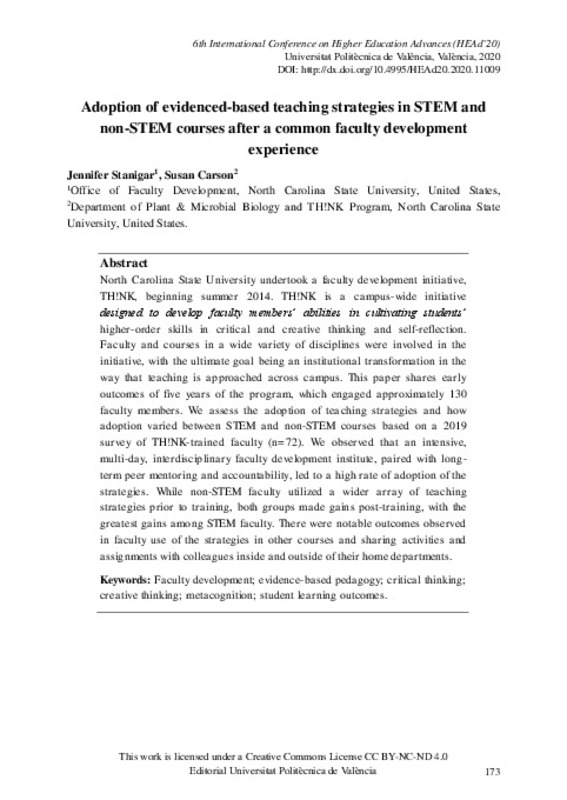JavaScript is disabled for your browser. Some features of this site may not work without it.
Buscar en RiuNet
Listar
Mi cuenta
Estadísticas
Ayuda RiuNet
Admin. UPV
Adoption of evidenced-based teaching strategies in STEM and non-STEM courses after a common faculty development experience
Mostrar el registro sencillo del ítem
Ficheros en el ítem
| dc.contributor.author | Stanigar, Jennifer
|
es_ES |
| dc.contributor.author | Carson, Susan
|
es_ES |
| dc.coverage.spatial | east=-78.6820946; north=35.7846633; name=North Carolina State University, 1151 Varsity Dr, Raleigh, NC 27607, Estats Units d'Amèrica | es_ES |
| dc.date.accessioned | 2020-06-05T08:20:03Z | |
| dc.date.available | 2020-06-05T08:20:03Z | |
| dc.date.issued | 2020-04-28 | |
| dc.identifier.isbn | 9788490488119 | |
| dc.identifier.issn | 2603-5871 | |
| dc.identifier.uri | http://hdl.handle.net/10251/145463 | |
| dc.description.abstract | North Carolina State University undertook a faculty development initiative, TH!NK, beginning summer 2014. TH!NK is a campus-wide initiative designed to develop faculty members’ abilities in cultivating students’ higher-order skills in critical and creative thinking and self-reflection. Faculty and courses in a wide variety of disciplines were involved in the initiative, with the ultimate goal being an institutional transformation in the way that teaching is approached across campus. This paper shares early outcomes of five years of the program, which engaged approximately 130 faculty members. We assess the adoption of teaching strategies and how adoption varied between STEM and non-STEM courses based on a 2019 survey of TH!NK-trained faculty (n=72). We observed that an intensive, multi-day, interdisciplinary faculty development institute, paired with long-term peer mentoring and accountability, led to a high rate of adoption of the strategies. While non-STEM faculty utilized a wider array of teaching strategies prior to training, both groups made gains post-training, with the greatest gains among STEM faculty. There were notable outcomes observed in faculty use of the strategies in other courses and sharing activities and assignments with colleagues inside and outside of their home departments. | es_ES |
| dc.language | Inglés | es_ES |
| dc.publisher | Editorial Universitat Politècnica de València | es_ES |
| dc.relation.ispartof | 6th International Conference on Higher Education Advances (HEAd'20) | |
| dc.rights | Reconocimiento - No comercial - Sin obra derivada (by-nc-nd) | es_ES |
| dc.subject | Higher Education | es_ES |
| dc.subject | Learning | es_ES |
| dc.subject | Educational systems | es_ES |
| dc.subject | Teaching | es_ES |
| dc.subject | Faculty development | es_ES |
| dc.subject | Evidence-based pedagogy | es_ES |
| dc.subject | Critical thinking | es_ES |
| dc.subject | Creative thinking | es_ES |
| dc.subject | Metacognition | es_ES |
| dc.subject | Student learning outcomes. | es_ES |
| dc.title | Adoption of evidenced-based teaching strategies in STEM and non-STEM courses after a common faculty development experience | es_ES |
| dc.type | Capítulo de libro | es_ES |
| dc.type | Comunicación en congreso | es_ES |
| dc.identifier.doi | 10.4995/HEAd20.2020.11009 | |
| dc.rights.accessRights | Abierto | es_ES |
| dc.description.bibliographicCitation | Stanigar, J.; Carson, S. (2020). Adoption of evidenced-based teaching strategies in STEM and non-STEM courses after a common faculty development experience. En 6th International Conference on Higher Education Advances (HEAd'20). Editorial Universitat Politècnica de València. (30-05-2020):173-181. https://doi.org/10.4995/HEAd20.2020.11009 | es_ES |
| dc.description.accrualMethod | OCS | es_ES |
| dc.relation.conferencename | Sixth International Conference on Higher Education Advances | es_ES |
| dc.relation.conferencedate | Junio 02-05,2020 | es_ES |
| dc.relation.conferenceplace | València, Spain | es_ES |
| dc.relation.publisherversion | http://ocs.editorial.upv.es/index.php/HEAD/HEAd20/paper/view/11009 | es_ES |
| dc.description.upvformatpinicio | 173 | es_ES |
| dc.description.upvformatpfin | 181 | es_ES |
| dc.type.version | info:eu-repo/semantics/publishedVersion | es_ES |
| dc.description.issue | 30-05-2020 | |
| dc.relation.pasarela | OCS\11009 | es_ES |








